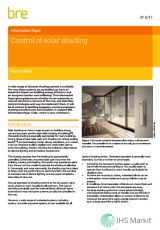Control of solar shading IP 4 17
BRE (Building Research Establishment) is an independent, research-based consultancy, testing and training organisation, operating in the built environment and associated industries.
Control of solar shading (IP 4/17) was written by Paul Littlefair and published by BRE on 2 November 2017. The 8 page Information Paper replaces IP 12/02, which has been withdrawn.
Solar shading can have a major impact on building energy use and occupant comfort, reducing cooling load and overheating. Under cloudy conditions, moveable shading can be retracted to allow daylight and useful solar gain to enter the buildings, reducing dependence on electric lighting and heating.
A wide range of dynamic shading systems is available. The way these systems are controlled can have a significant impact on building energy efficiency and on occupant comfort and wellbeing.
IP 4/17 gives guidance about whether to use automatic or manual controls, or a mixture of both, and describes a range of control strategies and how to implement them. It will be of interest to building designers, services engineers, shading manufacturers and installers.
[edit] Related articles on Designing Buildings Wiki
- BRE articles on Designing Buildings Wiki.
- BRE Trust.
- BRE Expert Collection 6 Daylight and shading.
- Building Research Establishment BRE.
- Daylight benefits in healthcare buildings.
- Daylight lighting systems.
- Daylit space.
- Lighting and health infographic.
- Retrofitting solar shading.
- Solar shading.
- Solar shading of buildings BR 364.
- When hospital buildings aren’t healthy.
- Wind Resistance for External Blinds.
Featured articles and news
Resident engagement as the key to successful retrofits
Retrofit is about people, not just buildings, from early starts to beyond handover.
What they are, how they work and why they are popular in many countries.
Plastic, recycling and its symbol
Student competition winning, M.C.Esher inspired Möbius strip design symbolising continuity within a finite entity.
Do you take the lead in a circular construction economy?
Help us develop and expand this wiki as a resource for academia and industry alike.
Warm Homes Plan Workforce Taskforce
Risks of undermining UK’s energy transition due to lack of electrotechnical industry representation, says ECA.
Cost Optimal Domestic Electrification CODE
Modelling retrofits only on costs that directly impact the consumer: upfront cost of equipment, energy costs and maintenance costs.
The Warm Homes Plan details released
What's new and what is not, with industry reactions.
Could AI and VR cause an increase the value of heritage?
The Orange book: 2026 Amendment 4 to BS 7671:2018
ECA welcomes IET and BSI content sign off.
How neural technologies could transform the design future
Enhancing legacy parametric engines, offering novel ways to explore solutions and generate geometry.
Key AI related terms to be aware of
With explanations from the UK government and other bodies.
From QS to further education teacher
Applying real world skills with the next generation.
A guide on how children can use LEGO to mirror real engineering processes.
Data infrastructure for next-generation materials science
Research Data Express to automate data processing and create AI-ready datasets for materials research.
Wired for the Future with ECA; powering skills and progress
ECA South Wales Business Day 2025, a day to remember.
AI for the conservation professional
A level of sophistication previously reserved for science fiction.























